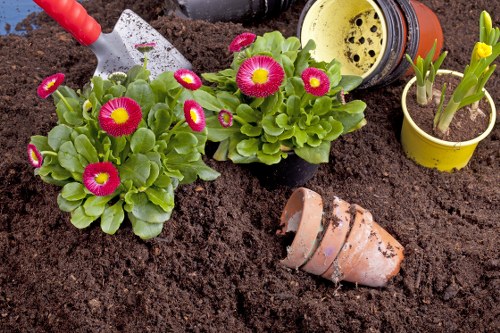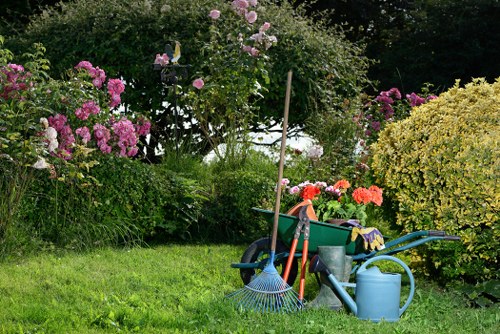Effective Driveway Algae Removal in Stevenage

Algae growth on driveways is a common issue, especially in damp and shaded areas like Stevenage. Not only does it make your driveway look unsightly, but it can also become slippery and hazardous. Understanding the best methods for driveway algae removal can help you maintain a safe and appealing property.
In Stevenage, the climate often contributes to the rapid growth of algae on driveways. The combination of moisture, shade, and organic debris creates an ideal environment for algae to thrive. Addressing this problem promptly is essential to prevent long-term damage and ensure the longevity of your driveway.
There are several effective techniques for removing algae from driveways, ranging from natural remedies to professional cleaning services. Each method has its advantages, and choosing the right one depends on the severity of the algae growth and your personal preferences.

Understanding Algae Growth
Algae are simple plants that thrive in moist environments with adequate sunlight. On driveways, they often appear as green or black patches, making surfaces slippery and unattractive. Factors such as roof overhangs, trees, and lack of proper drainage can exacerbate algae growth by keeping the driveway damp for extended periods.
Different types of algae can grow on driveways, including green algae and black algae. Green algae are generally easier to remove and less damaging, while black algae can penetrate the surface of the driveway, causing more significant issues.
Regular maintenance and prompt removal of algae are crucial in preventing its spread. Ignoring algae growth can lead to more severe problems, including pavement deterioration and safety hazards.

Natural Methods for Algae Removal
For those who prefer eco-friendly solutions, several natural methods can effectively remove algae from driveways. These methods are generally safe for the environment and can be just as effective as chemical treatments.
Vinegar Solution
A mixture of white vinegar and water can be sprayed directly onto the algae-infested areas. Let it sit for about 15-20 minutes before scrubbing with a stiff brush and rinsing with water. Vinegar's acidity helps kill the algae without damaging the driveway surface.
Baking Soda Paste
Creating a paste with baking soda and water and applying it to the affected areas can help eliminate algae. After allowing the paste to sit for an hour, scrub the driveway and rinse thoroughly. Baking soda is a gentle abrasive that removes algae effectively.
Boiling Water
Pouring boiling water directly onto the algae can kill and remove it. This method is simple and chemical-free, making it a great option for environmentally conscious homeowners.

Chemical Solutions for Stubborn Algae
For more persistent algae growth, chemical treatments may be necessary. It's important to use these products carefully to avoid damaging the driveway or the surrounding environment.
Bleach Treatments
Mixing bleach with water and applying it to the algae can effectively kill and remove the growth. However, bleach can be harsh on surfaces and should be used sparingly. Always follow the manufacturer's instructions and rinse the driveway thoroughly after application.
Commercial Algae Cleaners
There are numerous commercial products available specifically designed for algae removal. These cleaners are formulated to target algae without causing harm to the driveway surface. Always choose a reputable brand and adhere to the safety guidelines provided.
Pressure Washing
Using a pressure washer can effectively remove algae and other stains from your driveway. This method uses high-pressure water to blast away the growth, providing a deep clean. It's recommended to hire professionals for this task to ensure it's done safely and effectively.

Preventing Future Algae Growth
Once you've successfully removed algae from your driveway, it's essential to take preventive measures to avoid its return. Implementing these strategies can help keep your driveway clean and safe year-round.
Improve Drainage
Ensuring proper drainage around your driveway can significantly reduce moisture accumulation. This can be achieved by grading the driveway to slope away from buildings and installing drainage systems like French drains or channel drains.
Trim Vegetation
Excessive shade contributes to a damp environment, promoting algae growth. Trimming trees and shrubs near your driveway can increase sunlight exposure, helping to keep the area dry and less hospitable to algae.
Regular Cleaning
Maintaining a regular cleaning schedule prevents the buildup of organic debris and moisture. Sweep away leaves and debris, and wash the driveway periodically to keep it clean and algae-free.
Seal the Driveway
Applying a sealant to your driveway creates a protective barrier against moisture and stains. Sealants can help repel water, making it more difficult for algae to establish itself.
Choosing a Professional Algae Removal Service in Stevenage
While DIY methods can be effective for minor algae issues, persistent or widespread growth often requires professional intervention. Hiring a reputable driveway algae removal service in Stevenage ensures thorough and lasting results.
Benefits of Professional Cleaning
- Expertise: Professionals have the knowledge and experience to handle various types of algae and driveway surfaces.
- Proper Equipment: They use specialized equipment that provides a deeper clean without damaging the driveway.
- Time-Saving: Hiring experts saves you time and effort, allowing you to focus on other important tasks.
- Long-Term Solutions: Professionals can offer advice and treatments that prevent future algae growth.
What to Look For
- Reputation: Choose a company with positive reviews and a strong local presence in Stevenage.
- Insurance: Ensure the service provider is insured to protect against any potential damage during the cleaning process.
- Environmental Practices: Select a company that uses eco-friendly products and practices to minimize environmental impact.
- Guarantees: Look for services that offer guarantees or warranties on their work.
Nearby Areas Benefiting from Driveway Algae Removal Services
Driveway algae removal services in Stevenage extend to several nearby areas, ensuring that more residents can maintain clean and safe driveways. Here are some of the closest areas serviced:
- Ackworth: Located just north of Stevenage, Ackworth is a vibrant community with many homes benefiting from professional algae removal.
- Arlington: A short distance southeast of Stevenage, Arlington residents enjoy pristine driveways thanks to local cleaning services.
- Borehamwood: To the southwest, Borehamwood benefits from expert driveway maintenance, keeping algae at bay.
- Cleveland: Northeast Stevenage, Cleveland residents have access to comprehensive algae removal solutions.
- Datchworth: West of Stevenage, Datchworth homeowners rely on trusted services for algae-free driveways.
- Grange: Grange, located nearby, also enjoys the benefits of professional algae cleaning services.
- Hadley: South of Stevenage, Hadley residents maintain clean driveways with regular algae removal.
- Leverstock Green: Another nearby area, Leverstock Green, benefits from timely and effective algae removal.
- Manor: Located to the east, Manor residents keep their driveways algae-free with local services.
- Old Stevenage: In the historic part of Stevenage, Old Stevenage enjoys well-maintained driveways thanks to algae removal experts.
FAQs about Driveway Algae Removal in Stevenage
1. How often should I clean my driveway to prevent algae growth?
Regular cleaning, at least once or twice a year, can help prevent algae buildup. However, the frequency may vary depending on your local climate and the level of shade and moisture around your driveway.
2. Can algae damage my driveway permanently?
Yes, persistent algae growth can lead to surface deterioration and make the driveway slippery, posing safety risks. It's important to address algae promptly to prevent long-term damage.
3. Are there eco-friendly options for algae removal?
Absolutely. Natural solutions like vinegar, baking soda, and boiling water are effective and environmentally friendly. Additionally, some professional services offer eco-friendly cleaning options.
4. Is it necessary to hire a professional for algae removal?
While DIY methods can work for minor issues, hiring a professional ensures thorough cleaning and long-term prevention, especially for larger or more stubborn algae growth.
5. How can I prevent algae from returning to my driveway?
Implementing preventive measures such as improving drainage, trimming surrounding vegetation, regular cleaning, and applying a driveway sealant can significantly reduce the chances of algae returning.


